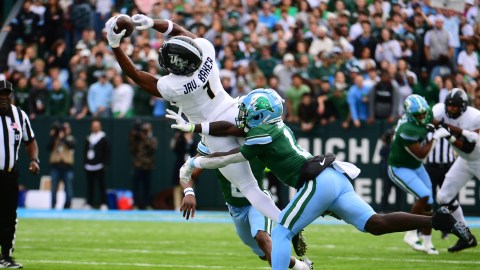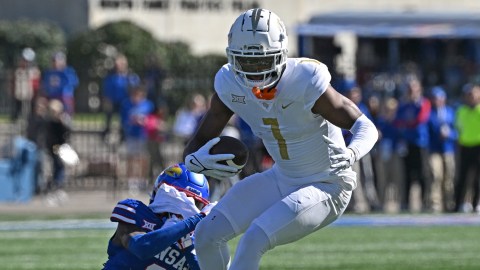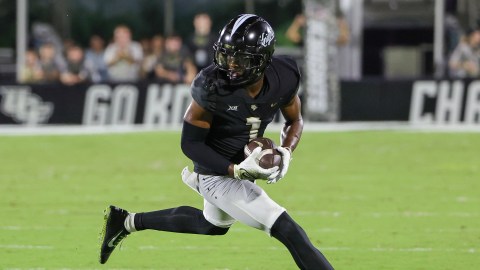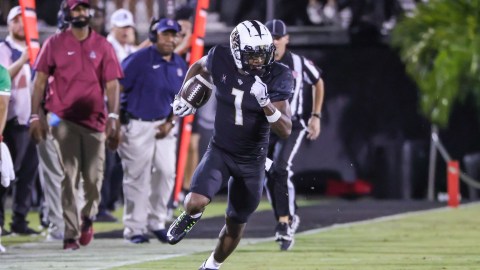The Curse of Bernard Pollard has struck again, this time claiming New England Patriots wide receiver Wes Welker.
Pollard, a household name in New England, was credited with the tackle on the play in which Welker reportedly tore two ligaments in his left knee during Sunday's loss to the Houston Texans. Welker caught a pass over the middle and ran up the field for a 12-yard gain on the Patriots' fourth offensive play of the game. When he cut to the right to avoid a hit from Pollard, Welker's left knee gave out, and the man who caught a Patriots-record 123 passes this season won't be around for the playoffs.
While Patriots head coach Bill Belichick said multiple times on Sunday that he didn't have an update on Welker's status, it's a good bet Belichick was already formulating a game plan without his 2009 offensive MVP.
Of course, the last time Pollard encountered the Patriots — then as a member of the Kansas City Chiefs — he crashed into Tom Brady's left knee, and the quarterback's 2008 season was over in the first quarter of the season opener. Clearly, Pollard's plan to eliminate Patriots record-setters one left knee at a time has yet to simmer.
Without Welker, the Patriots have some serious work to do offensively. After Welker's injury Sunday, Brady completed 15 of 23 passes for 163 yards, no touchdowns and one interception, which naturally landed in Pollard's hands. Welker missed two games earlier this season with a knee injury — Week 2 against the New York Jets and Week 3 against the Atlanta Falcons — and Brady's numbers declined without his shifty receiver in the lineup.
Including those two full games and Brady's numbers Sunday after Welker's injury, Brady has completed 63 of 112 passes (56.3 percent) for 656 yards, one touchdown and two interceptions without No. 83 in pads. With Welker in the lineup — including the three passing plays Sunday prior to his injury — Brady has completed 68.4 percent of his passes this season. So, even though the whole world knows where Brady is throwing the ball, he is still completing an extra 12.1 percent of his passes when Welker is in uniform.
Without Welker, rookie Julian Edelman has been the primary beneficiary, recording 17 of his 37 receptions during the three games in which Welker has been injured. In those games, Brady has completed 17 of the 29 passes thrown in Edelman's direction for 182 yards. Here is how Brady has distributed the ball in the two full games Welker has missed in addition to Sunday's game after Welker's injury:
-Wide receiver Randy Moss: Brady has completed 17 of the 28 passes thrown in his direction (60.7 percent) for 197 yards and no touchdowns.
-Edelman: 17 of 29 (58.6), 182 yards, no touchdowns.
-Wide receiver Joey Galloway: 7 of 17 (41.2), 67 yards, no touchdowns.
-Tight end Ben Watson: 6 of 11 (54.5), 67 yards, no touchdowns.
-Running back Sammy Morris: 6 of 8 (75.0), 65 yards, no touchdowns.
-Tight end Chris Baker: 4 of 6 (66.7), 56 yards, one touchdown.
-Running back Kevin Faulk: 4 of 5 (80.0), 15 yards, no touchdowns.
-Running back Fred Taylor: 1 of 1 (100.0), four yards, no touchdowns.
-Wide receiver Sam Aiken: 1 of 6 (16.7), three yards, no touchdowns.
-Running back Laurence Maroney: 0 of 1.
Since 33.2 percent of Brady's completions this season have gone to Welker, the Patriots were in dire need of some live practice Sunday against the Texans. It's unclear how much Brady, Moss and the rest of the offensive starters would have played if Welker hadn't gone down, but the Patriots made an honest attempt to find a rhythm with other weapons.
Obviously, Edelman will see an increase in touches without Welker in the lineup, but it would be unfair to put the burden solely on the rookie, who has the athletic ability to make some electric plays but doesn't read defenses as well as Welker. Therefore, it will be important to include Watson and Baker on more passing routes, and it would make sense to increase the amount of halfback screens they use. The Patriots will also need Brady and the offensive line to do a better job of reading and protecting defensive blitz deployments, as Brady's hot routes and check-downs won't be run as smoothly without Welker.
In the short term, the Patriots might have caught a break by hosting the Baltimore Ravens in the first round of the playoffs. There were stretches when the Ravens' depleted secondary had a difficult time containing New England's receivers in their Week 4 meeting at Gillette Stadium, where Brady completed 21 of 32 passes for 258 yards, one touchdown and no interceptions. Welker, though, had a team-high six receptions for 48 yards, so each team will clearly need to change its original plan of attack.
If the Patriots get past the Ravens, they'll be forced to deal with the Indianapolis Colts or the San Diego Chargers, each of whom have seriously explosive offenses. While Brady and the Pats' offense have to compensate without one of their leaders, the New England defense will also have to play a role, alleviating some of the pressure on the offense and taking its own game up a notch.
Losing a player of Welker's caliber doesn't affect just one player, one position or one side of the ball. It will take a full team effort, from players and coaches alike, to pick up the slack.



